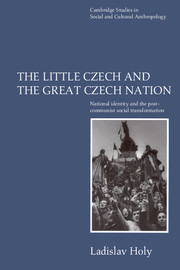 The Little Czech and the Great Czech Nation
The Little Czech and the Great Czech Nation Book contents
- Frontmatter
- Contents
- Acknowledgements
- Introduction
- 1 Nation against state
- 2 Freedom, nation, and personhood
- 3 Self-stereotypes and national traditions
- 4 National traditions and the imagining of the nation
- 5 National traditions and the political process
- 6 Nation and state in the context of Czech culture
- Notes
- References
- Index
- Frontmatter
- Contents
- Acknowledgements
- Introduction
- 1 Nation against state
- 2 Freedom, nation, and personhood
- 3 Self-stereotypes and national traditions
- 4 National traditions and the imagining of the nation
- 5 National traditions and the political process
- 6 Nation and state in the context of Czech culture
- Notes
- References
- Index
Summary
Most of the sociological and political-scientific writing on Central and Eastern Europe is still grounded in a sociological universalism (Kapferer 1988: 3) which treats this region as a politically, economically, and, to some extent, even culturally undifferentiated whole. Various Central and Eastern European countries up to 1989 had essentially the same political and economic system and at present are undergoing what is again seen as essentially the same kind of transformation from a totalitarian political system to democratic pluralism and from a centrally planned to a market economy. Although various countries of the former Eastern bloc displayed many common features which made it possible to perceive the socialist system as radically different from the capitalist and liberal-democratic systems of the free world, there were also considerable differences among them. In so far as Western observers and commentators paid attention to these differences, they explained them by reference to pre-socialist history and political culture (Brown and Gray 1979; Rothschild 1989).
Social equality was an important aspect of the ideology of all former socialist countries, but in Czechoslovakia it was realised in practice to a far more significant degree than anywhere else in Eastern Europe. Czechoslovakia eliminated the private sector to a much greater extent and had a more egalitarian income policy than the other states of the socialist bloc. The political system in Czechoslovakia also had its specific features even under communist rule, particularly in retaining the office of president of the republic (Taborsky 1961: 167–72, 182–95).
- Type
- Chapter
- Information
- The Little Czech and the Great Czech NationNational Identity and the Post-Communist Social Transformation, pp. 1 - 15Publisher: Cambridge University PressPrint publication year: 1996
